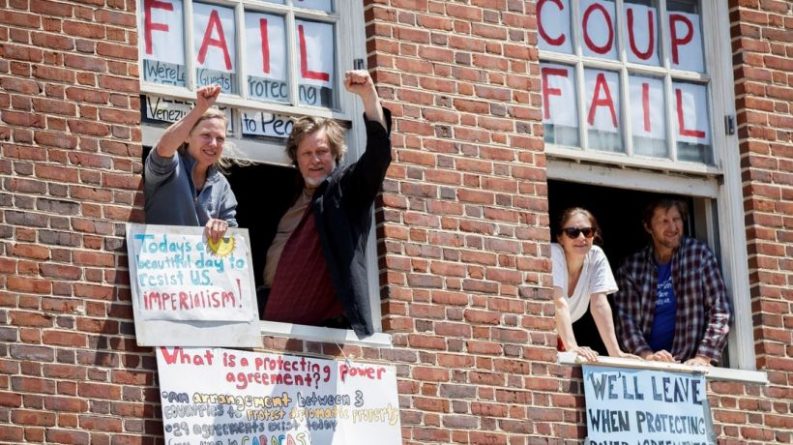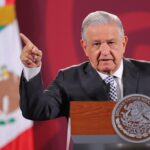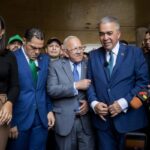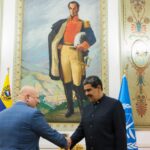
By Bruno Sgarzini
When Reverend Jesse Jackson, icon of the civil rights struggle in the States, delivered food to four activists at the Venezuelan embassy this Wednesday, a chill must have flowed down the back of Secretary of State Mike Pompeo.
Every time the activists needed food or water, a public figure could be out there to give it to them and it would be much harder for the Secret Service and the anti-Chavistas to stop them. And if they did it with blows, the photo would go around the world as in fact did happen with many of the clashes that took place outside the embassy.
The reaction was immediate: a day later, Mike Pompeo ordered the State Department to invade the Venezuelan embassy in Washington in violation of articles 32 and 45 of the Vienna Convention, which states that the receiving State is in charge of protecting the diplomatic headquarters from another country, and in case of a rupture of relations, the custody of the same should be granted to a third State accepted by both parties.
RELATED CONTENT: National Mobilization Saturday May 18 at the Venezuelan Embassy in D.C.
El reverendo Jesse Jackson denunció que los de Guaidó están tratando de impedir el acceso a agua y comida de las personas que están en la embajada y dijo que volverá a entregarles alimentos las veces que sean necesarias.
— · Hibai Arbide Aza · (@Hibai_) May 16, 2019
Thus, the United States used the Vienna Convention as toilet paper, after besieging the embassy for more than a month with the gallant anti-Chavistas.
THE STRUGGLE FOR THE EMBASSY AS A SIMULATION OF WHAT HAPPENS IN VENEZUELA
The wet dream of Juan Guaidó ended up being fulfilled: the United States, finally, invaded Venezuela, without clowns like his representative in the United States, Carlos Vecchio and his people, being able to avoid the bad taste of seeing pictures of Secret Service officers in the embassy. The first thing to remember is that according to Vecchio’s arrogance, the taking of the embassy was little more than a formality in which he had to go to sign a paper and enter the big door, escorted by the Secret Service. The process, however, became entangled with time, so much so that he had to wait in line with the invasion order of the State Department.
¿Qué significa hoy la Convención de Viena?, ¿será que solo se acuerdan de ella cuando NO es una potencia quien la viola? Esta imagen parece de película, pero no, es la propia policía de EE.UU en las instalaciones de la Embajada de Venezuela en #Washington, ¡penoso precedente! pic.twitter.com/1TWSrEyJQd — David Morales (@MoralesFlamenco) May 16, 2019
His spokesman in one week recorded it fully: last Thursday he celebrated euphorically as he had given a “share of failed socialism” to the 50 activists with the cut of electricity in the embassy, and this Wednesday he prayed that the Reverend Jesse Jackcson would realize that “he supported a brutal dictatorship.”
RELATED CONTENT: Who’s Behind the Pro-Guaidó Crowd Besieging Venezuela’s D.C. Embassy?
Completely displaced, Vecchio witnessed the coup of public opinion that the Embassy Protection Collective handed him in forcing him out of the comfortable playing field in which anti-Chavez leaders give a pre-fabricated speech of “struggle against dictatorship and defense of human rights”. What was going to be a proceeding with a quota of fake epic (restorer of democracy) became a comedy of entanglements, where his followers were portrayed hitting American citizens.
Instead, the pulse of the embassy became a kind of HD (or 3D) simulation of the US war against Venezuela. Live and direct, the American public observed how their own people were treated in the same way that Venezuelans are treated, beyond their political position.
In that sense, the cleavage that completely dislodged Vecchio was that the discussion began to pass through the division between those in favor and those against a war in Venezuela.
WHY DID THE EMBASSY PROTECTION COLLECTIVE WIN?
In World War I, one of the fundamental tasks of the United States Public Information Commission was to sell to Americans that entry into the struggle was necessary to defend their interests. “To accept something initially unwanted that followed a certain agenda,” wrote Walter Lipptman, one of the members of the commission.
Edward Bernays, author of Consent Engineer, stated that “the best way to do it was to create news that appealed to the emotions of the public so that the ideas to be transported could arrive better”. The father of false news thus determined that in this way a consensus could be drawn up in favor of the war.
Momento en que la policía federal estadounidense, contra toda norma internacional, ingresó a la Embajada de Venezuela en Washington DC.
16 de Mayo 2019, no lo olviden. pic.twitter.com/EYnNKgaP5o
— Alina R. Duarte (@AlinaTelesur) May 16, 2019
At a certain point, what the Embassy Protection Collective generated was empathy for their cause to be located as the victims of the outrage of the Secret Service and the anti-Chavez mob. After all, they are Americans who are protesting against a war in Venezuela that would not fix any problem in the United States, as the others also didn’t.
One of the most important achievements, in this direction, is to have broken the siege imposed on public opinion so that what happens in Venezuela, really, is discussed in depth, as happened in the times of Vietnam (when the war became the headache of several American presidents).
The simulation of the siege of Venezuela, in addition to being an exemplary act of solidarity, interposed a feeling that exists deep within American society. On the other side, Vecchio and company did everything possible to squander the little prestige they had obtained in public opinion in favor of their ignoble cause of siege and asphyxia against Venezuela.
AND NOW WHAT?
It may sound optimistic, but what happened at the embassy in Venezuela opened a gap that can hardly be closed: the Venezuelan cause allowed the US anti-war movement to warmly test the scope of this type of action in the public opinion. Some time ago they have been doing it in social networks, alternative media. But this represents a significant leap forward in a US society that is in full boil because of the social conditions it is going through.
The presidential campaign of 2020 is a fact that is going to be, in large part, about not making more wars, so the rise of anti-establishment dissident voices, possibly, influence its development. Those who defended the embassy of Venezuela, and put their bodies at risk for it, have a number on that list. In a moment, where, in addition, it can happen that actions like this be repeated and perfected, making it much more difficult to counteract them, as happened by way of the facts.
Another big question that remains afloat, in this context of defense of embassies and announcements of dialogues in Norway, is how Donald Trump in his campaign will want to present: as the president went to a stupid war in Venezuela (or Iran) dragged by those really insane as John Bolton? or the one who found a way out of the Venezuelan quagmire through negotiation?
Translated by: EF/JRE
- orinocotribunehttps://orinocotribune.com/author/orinocotribune/
- orinocotribunehttps://orinocotribune.com/author/orinocotribune/April 24, 2024
- orinocotribunehttps://orinocotribune.com/author/orinocotribune/
- orinocotribunehttps://orinocotribune.com/author/orinocotribune/April 23, 2024
Tags: Carlos Vecchio Defending the Embassy in DC Embassy Protection Collective Jesse Jackson Juan Guaido
Share this:
- Click to share on Twitter (Opens in new window)
- Click to share on Facebook (Opens in new window)
- Click to share on LinkedIn (Opens in new window)
- Click to share on WhatsApp (Opens in new window)
- Click to share on Reddit (Opens in new window)
- Click to share on Telegram (Opens in new window)
- Click to email a link to a friend (Opens in new window)




